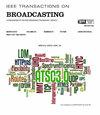基于MMSE预编码的下行MISO-RSMA系统可靠性提高
IF 4.8
1区 计算机科学
Q2 ENGINEERING, ELECTRICAL & ELECTRONIC
引用次数: 0
摘要
速率分割多址(RSMA)被认为是下一代广播和移动通信系统中最有前途的技术之一。以往的RSMA系统设计多侧重于从信息论分析出发的容量优化,而对实际部署中的可靠性考虑较少。为此,本文通过最小化与最差用户设备(UE)相关的均方误差(MSE),精心设计了下行链路多输入单输出(MISO)-RSMA系统的线性预编码器。优化问题首先从信号处理的角度研究每个UE的MSE,其中对私有消息使用零强制(ZF)预编码。然后利用公共预编码向量的半定松弛(SDR),推导出私有和公共消息之间的封闭式最优功率分配系数,得到最小MSE (MMSE)预编码。然后提出了一种启发式封闭解,以降低半确定规划(SDP)所带来的复杂性。仿真结果表明,即使可以部署接近最优的加权MMSE算法,所提出的方案也比基于最大最小公平性(MMF)速率优化的空分多址(SDMA)和传统的RSMA方法具有可靠性优势。本文章由计算机程序翻译,如有差异,请以英文原文为准。
MMSE Precoding for Reliability Enhancement in Downlink MISO-RSMA Systems
Rate splitting multiple access (RSMA) has been regarded as one of the most promising technologies for the next-generation broadcasting and mobile communication systems. Many prior designs for RSMA systems focused on the capacity optimization from the information-theoretic analysis, while the reliability in realistic deployment is less considered. To this end, the linear precoder of downlink multiple-input single-output (MISO)-RSMA systems is elaborately designed in this paper by minimizing the mean square error (MSE) associated with the worst user equipment (UE). The optimization problem is first formulated by investigating the MSE for each UE from the view of signal processing, where the zero-forcing (ZF) precoding is utilized for the private messages. The minimum MSE (MMSE) precoding is then obtained by utilizing the semi-definite relaxation (SDR) for the common precoding vector and deriving the closed-form optimal power allocation coefficient between private and common messages. A heuristic closed-form solution is then developed to reduce the complexity caused by the semi-definite programming (SDP). Simulation results demonstrate the reliability superiority of the proposed schemes beyond space-division multiple access (SDMA) and conventional RSMA approaches based on the max-min fairness (MMF) rate optimization even though the near-optimal weighted MMSE algorithm can be deployed.
求助全文
通过发布文献求助,成功后即可免费获取论文全文。
去求助
来源期刊

IEEE Transactions on Broadcasting
工程技术-电信学
CiteScore
9.40
自引率
31.10%
发文量
79
审稿时长
6-12 weeks
期刊介绍:
The Society’s Field of Interest is “Devices, equipment, techniques and systems related to broadcast technology, including the production, distribution, transmission, and propagation aspects.” In addition to this formal FOI statement, which is used to provide guidance to the Publications Committee in the selection of content, the AdCom has further resolved that “broadcast systems includes all aspects of transmission, propagation, and reception.”
 求助内容:
求助内容: 应助结果提醒方式:
应助结果提醒方式:


